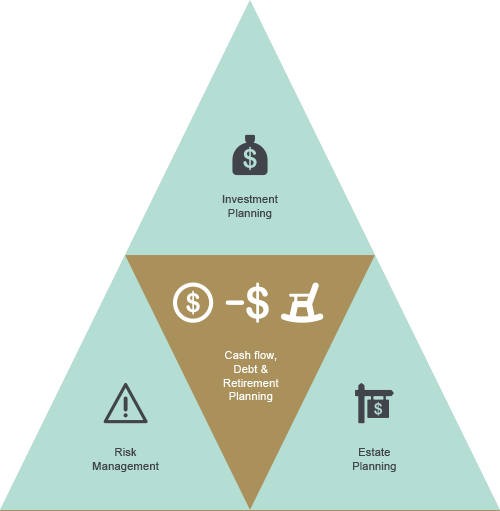Debt Management
“Creditors have better memories than debtors”. Benjamin Franklin.
Managing what you borrow is crucial to your financial plan. We all accept that there are times when we need to borrow money to make a big step forward or in order to achieve a certain goal.
This might be a student loan which ensures you are able to attend university or a home loan to buy a home or rental property. We will classify these types of debt into two categories:
Smart Debt
Smart debt allows you to get ahead in a way otherwise impossible and the benefit of borrowing outweighs the cost. A mortgage is the perfect example.

The focus should be on repaying this debt as soon as possible. The total interest cost savings can be great when repaid early, as we will demonstrate below. The debt may also be tax-effective, as is the case currently with rental property investment, if structured correctly. Debt to purchase assets which appreciate over time is more sensible than debt to purchase items which depreciate.
Non tax effective debt should be repaid before tax effective debt.
Below is an example of how much can be saved in total interest cost on a $200,000 loan at 6%, if you repay this over 20 years instead of 25 years:
.
Loan A
Loan Amount: $200,000
Interest Rate: 6%
Term of Loan: 25 Years
Monthly Payment Amount : $1,288.60
Total Interest Cost Over 25 Years: $186,580
Loan B
Loan Amount: $200,000
Interest Rate: 6%
Term of Loan: 20 Years
Monthly Payment Amount: $1,432.86
Total Interest Cost Over 20 Years: $143,886
By repaying your loan 5 years early on the above basis you will save yourself $42,694 in total interest costs. This is achieved by paying $144.26 extra per month on your mortgage repayments. If you equate this to bought coffees at $4.00 each, and you purchase two a day every working week, this is equivalent to $40.00 per week or $160.00 per month. Doesn’t it make sense to pay this off your mortgage and drink instant coffee instead?
Not-so Smart Debt
Using debt to purchase depreciating assets is not so smart. Depreciating assets are those which lose rather than gain value, for example a car or a home appliance. This debt may be on a credit card or a hire purchase arrangement. You need to be aware of the true cost of this type of funding, so ensure you always fully understand any contracts or terms and conditions before signing up. Even interest-free debt can be misleading. You may well be able to negotiate a discount for cash and you haven’t committed tomorrow’s dollars today. You never know what the future will bring.
Emergency Funding
It is prudent to have savings equivalent to at least 3-6 months expenses to fund costs such as vehicle repair, home appliances or take advantage of higher excesses on your insurance premiums to bring payments down.